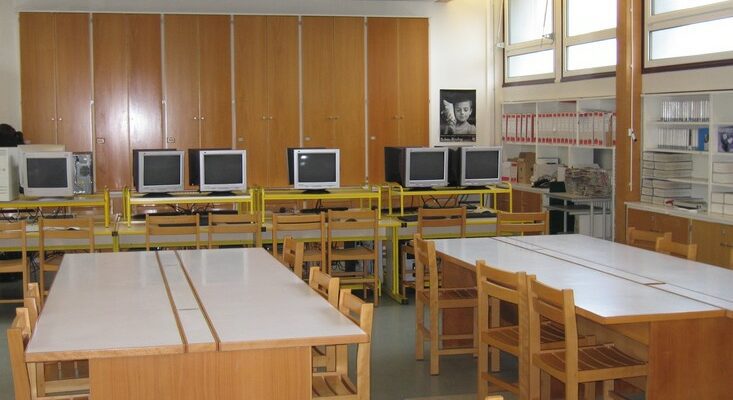A CDI room (Wikimedia Commons/public domain)
The Minister of National Education, Pap Ndiaye, presented on January 27 the “digital strategy for education 2023-2027”, which “is based on a series of measures to strengthen students’ digital skills and accelerate the use of digital tools for student success.
“Sovereign, secure, free and community tools”
In this forty-page document (PDF), it is stated that “the challenge of developing digital skills is twofold. It must allow:
• to transmit to each student a solid level of digital skills, guaranteeing them an essential digital fluency for understanding the world and good professional integration throughout life;
• to train, for those who wish and with the constant search for gender parity, experts likely to turn to studies and then digital professions, with the aim of training 400,000 to 500,000 additional digital professionals from here in 2027.”
Page 24 reads:
“In terms of educational tools and resources, teachers must be able to rely on sovereign, secure, free and community tools, that is to say “digital commons”, allowing them to build and share their productions with peers, but also take advantage of new generations of digital educational tools and resources to personalize lessons, differentiate learning and courses, thanks in particular to artificial intelligence, immersion, etc. .”
BigBlueButton, Moodle, two free software
And in a section titled “Supporting the Development of Digital Commons”:
“The term “digital commons” refers to a set of digital resources produced and managed by a community. By nature, they are shared and collective. The Ministry of National Education offers teachers several tools which can, for some of them, be used with their students. The “education.fr apps” service platform thus provides them with tools for collaboration or communication, such as “virtual classes” and “visio-agents”, both based on the free software BigBlueButton, or even tools for sharing files or the publication of videos hosted on French infrastructures in accordance with the Government’s digital sovereignty strategy. Similarly, the “Éléa” platform, based on the free software Moodle, allows teachers to create and share free educational resources and scripted digital learning paths for their students.
“Furthermore, communities of teachers (and other education stakeholders) can also be places where new tools are constructed. Professors, particularly from NSI or SNT, are waiting for a “forge” that would allow them to collaborate among peers and share computer code. The ministry responds to this need with the provision of a technologically sovereign and pooled forge on a national scale.
However, this forge now exists in beta version, on the initiative of Alexis Kauffmann who is piloting the project (as well as the Free Educational Day, the second edition of which will take place in Rennes on April 7, after Lyon in 2022, another project concrete impetus by the founder of Framasoft since his arrival at the digital department of the Ministry of National Education.
This forge is at https://forge.aeif.fr/. This is a #GitLab instance currently hosted by Clevercloud and led by the Association of Computer Science Teachers of France (AEIF).
In his presentation, Alexis Kauffmann explains: “This is the first time that such a project has seen the light of day at National Education, a project that does not correspond to the traditional circuits for the production of educational resources (by call for projects, public contracts …). If the mayonnaise takes, we will show that teachers are great creators and sharers of digital commons while allowing the rest of the community to benefit from it.
“Free and Sovereign Tools”
The 2023-2027 strategy also marks, p. 20 (about elementary school): “It takes the form of learning and implementing fundamental digital tools – office and collaborative tools, educational tools – through regular and dedicated educational actions in the curricula and in school time, relying on free and sovereign tools when they exist.”
And P. 37: “The opportunities for innovation are very diverse: the development of responsible digital technology, with consistency with the Sustainable Development Goals (SDGs), or even through the priority given to free software.”
Read also
Free and open source express: National Education on Mastodon, Smile and Europe, Red Hat, Nonfiction – November 1, 2022
Microsoft and National Education: Anticor files a complaint – May 15, 2022
National Education: 12 free digital projects – April 3, 2022
